- Home
- Raymond Benson
The Secrets on Chicory Lane Page 2
The Secrets on Chicory Lane Read online
Page 2
In this day and age, practicing witchcraft isn’t supposed to be considered a crime if that’s what a person does in private. Obviously, Eddie crossed the line into something far more serious. The way Eddie murdered his girlfriend was so shockingly heinous that the jury thought the convicted killer was the devil himself. Eddie had become an infamous celebrity smack dab in the middle of the Bible Belt. In the minds of that West Texas jury of good ol’ conservative boys and girls, he was Evil Eddie. It was best to simply execute him.
It was a tragedy.
I stare at Crane’s letter, debating whether I should call his office or not. Crane, a good man who has always done all that he can for Eddie, took on the case pro bono. Why would Eddie break his silence just days before he is scheduled to die? To apologize for not accepting my help? I don’t need an apology, but I admit part of me wants one. I believe Eddie refused to contact me during the trial because he didn’t want me involved in his sensational story—after all, at that time in the early 2000s, my career as a well-known romance author was on a solid, steady plateau. The media never connected Eddie and me as childhood friends who grew up on the same street, though I don’t think it would have bothered me—or hurt my sales, I dare say—if the tabloids had tied us together.
There is only one thing that makes sense: Eddie simply wants to see me before he dies. Surely that’s all there is to it. Christ, I think I do owe it to him. I have to do it. I am going to have to visit him. Otherwise, I’ll regret it. I’m already a member of the AARP; I don’t want to spend the precious years I have left with the guilty feeling that I’d done him a disservice.
I make up my mind, pick up my phone, and dial Crane’s office. When I tell the receptionist who I am, she quickly transfers me to the attorney.
“Hello, Ms. Truman?”
“Yes, hello, Mr. Crane, how are you?”
“Fine, and you? It’s been a few years.”
“Yes, it has. I’m doing well.”
“So I’ve seen. Congratulations on your success.”
The West Texas accent is very pronounced. I used to have one, too, but my many years of living in the Midwest have changed all that. However, after a few drinks, it does tend to slip out.
“Thank you. So, I got your letter. And your phone messages. Sorry, I should have responded sooner.”
“That’s all right.”
“I’ve decided I will come, I think. Do you know what Eddie wants to talk to me about?”
“Not at all. Eddie is always pretty quiet. After being locked up on death row at Polunsky, he’s even more withdrawn. That kind of solitary confinement is terribly … lonely.”
This alarms me. “What kind of mental state is he in?”
“Not too good, I’m afraid. I’ll be honest with you. That place will drive anyone crazy, and he’s been there for years. You and I know he suffers from depression and anxiety, and it’s unclear how well he complies with medication. I don’t think he takes it at all. He refuses any medical or psychiatric help; he always has. Mostly he lives in another world inside his head—on purpose, I might add—but he is capable of understanding and interacting with the real one when he wants to. His request to see you is sincere; I can tell you that, Ms. Truman.”
“You can call me Shelby. If I really do this, what can I expect? Will he be able to touch me?”
“No. Contact visits aren’t allowed with death row inmates. You’ll talk to him from behind a plexiglass partition. On a phone. You’ll be able to see him, and he’ll be able to see you.”
“And for how long?”
“Two hours usually, but since you’re traveling over 250 miles, they’ll let you have four. That’s the maximum time allowed, but I doubt he would talk to you that long. Like I said, he’s usually quiet and withdrawn, and when I’ve visited him he’s lucid for a while, and then he occasionally goes into a sort of surreal rant. Like what you see a homeless person doing. Babbling. You know what I mean?”
“I think so.”
“He doesn’t make much sense when he does that. Anyway, the visit can be whatever length you want. It could also be as short as five minutes, and that may be his choice. You never know with Eddie. Whenever I’ve gone to see him, he will listen and tell me what he wants me to do in a coherent, sensible way, and then he’ll zone out, go into babble-speak, and abruptly end the meeting. He’s a pretty sick man.”
“That’s terrible. How can the state allow him to be executed? It’s inhuman.”
“You’re preaching to the choir, Ms. Truman. I’m doing everything I can in last-minute appeals. Unfortunately, there’s a precedent. Texas has executed more than one inmate that was believed to be mentally ill.”
“It’s so wrong.”
“And just so you know … I’m the only visitor he’s had for twenty years.”
“Oh my God. All right. Tell me what I need to do. I have to be in Limite, coincidentally, on Friday.”
“That’s the date of the execution.”
“I know. And I don’t want to see him the day before he dies. What about Wednesday, can I do that?”
“That would be a good day.”
“All right. I’ll fly to Houston tomorrow and get settled somewhere near the prison, and then I’d have all day free on Wednesday. Is that possible?”
“Let me make some calls and I’ll get back to you to confirm a time. Thanks, Shelby, I think Eddie will really appreciate it.”
I confirm that he has all of my information, and we hang up.
The trip to Texas is going to be longer than originally planned, so Patricia is going to have to wait until I return before embarking her on a new adventure with some hunky bad boy. I get up from the desk without bothering to save my open Word document and go downstairs with my empty coffee cup.
“I’m going,” I announce.
“Really,” Billy responds without looking up from his monitor. “I’m impressed.”
“Why?”
“I didn’t think you’d go.”
“Why not?”
“I don’t know.” He shrugs. “Because it’s painful. I know the whole story.” Then he looks at me.
“Mm, you don’t know the whole story; but you’re right, it will stir up some old emotions that I’d just as soon do without.”
“You mean it’ll feel like ripping a scab off a wound and putting salt on it?”
“Something like that.”
“Then why are you putting yourself though it?”
“Because I have to. I owe it to Eddie.”
“You don’t owe Eddie anything, Shelby. You know that, right?”
“Billy, he hasn’t had a visitor for twenty years. He’s going to die on Friday. He has no family or friends. I’m the only person from his life that he’s chosen to remember. I never thought he deserved the death penalty. He’s mentally ill.”
“I know, but he did some pretty creepy shit.”
Billy has me there. I look away and study a map of the United States that I have pinned to a corkboard.
“Sorry, Shelby,” he says. “I didn’t mean—”
“It’s okay. Look.” I gesture to the map. “Huntsville is just a bit of a drive from George Bush International. Eddie’s in Livingston, over here nearby.”
“What will you have to do to get into the prison?”
“I don’t know. I imagine it’s like going through security when you get on a plane. Mr. Crane will tell me, I guess. Now, about that coffee.”
I go to the kitchen, fill my cup with fresh brew, and return upstairs. Instead of working on Patricia 43, I pull a suitcase out of the closet and bring it to my bedroom. As I use one half of my brain to figure out what I need to take on the trip, the other half dwells on a rush of mixed feelings.
Yes, Eddie did some pretty creepy shit. But it never would have happened had he not suffered what he did as a child. Eddie had been damaged, but he covered it up with his eccentric intellect and talent as an artist. He would have benefited from not having dropped out of high school, t
hat’s for sure. Instead he joined the army and went to Vietnam for a couple of years, which darkened him even more.
There’s no question about what happened to Dora Walton—and the baby she was carrying in her womb. Eddie was caught red-handed. Only a psychiatrist could analyze how the trauma Eddie endured as a child contributed to his illness and ended up informing a horrific murder later in life, but one thing is for sure—Eddie could not have been in his right mind when it happened.
It occurred ten years ago, in 2005. Eddie was fifty years old. He lived with Dora Walton in the same house on Chicory Lane, across from where I’d resided with my parents. A controversial pair, neighbors ostracized them, but Eddie refused to abandon his parents’ house. On Christmas Eve, Eddie threw a party and invited another couple, Wade Jones and Catherine Carter. He decorated the entire place with his disturbing artwork that depicted devilish symbols and imagery, and then lit a hundred black candles to illuminate it. When I knew him as an adult, Eddie once admitted to me that while he was truly an atheist, the Satanism thing was merely something he did to shock people. It was just “art,” he said.
That night, Eddie took his art to the extreme. Wade and Catherine left the house after midnight. Eddie and Dora continued to party. Eddie drugged the wine. Dora drank it; he didn’t.
After that, Evil Eddie made a statement for all the world to see.
3
I like to be at the airport early, so I had Billy drop me off two hours before my flight to Houston. O’Hare is hopping, as usual. You never know when lines will be super-long at one of the world’s busiest airports. As I’ve grown older, I’ve found that my nerves are less tolerant of unexpected stress. I don’t like to be rushed. I’d rather be way too early than a minute too late.
One of the best things about being a well-known author is that your face isn’t necessarily well-known. Sure, I’ve been on TV talk shows and my picture has been in tons of magazines—I even made a “50 And Still Hot” list in People eleven years ago!—but I’m not a movie star. Very few people recognize me, and I’m perfectly fine with that. My blonde hair has whitened, but my blue eyes remain the same. I’m able to travel like anyone else, go to restaurants, hotels, the theater, whatever—and still maintain a decent degree of anonymity. Every so often a serious fan will know who I am and maybe say something complimentary about my books, and that’s always nice. I’ve never had a bad experience with notoriety. Today is no different.
After going through security, I browse in the bookstore and, out of habit, check to see if they have any of my books. They do. I buy the new Sandra Brown and then get coffee and a snack. With my purchases in hand, I sit at the gate an hour before we start to board, ready to relax and enjoy my food and beverage.
Relax. Right. Apprehension has been my master since I agreed to see Eddie. I try to begin the book I bought, but my mind wanders and I can’t concentrate on the words in front of my eyes. I keep thinking about Eddie, dammit. A tidal wave of memories continues to bombard me: like when Eddie sold his crazy artwork at the mall during Christmas time in the nineties; the smell of pot and booze from the seventies; and glimpses of the sixties, which are dominated by memories that mostly occurred in a playground and a bomb shelter. Eddie at twenty-one, Eddie at thirty-nine, Eddie at eleven … I’ve come to the conclusion that it would be a good idea, if not essential, that I attempt to think of the remembrances in some kind of chronology so they make some sense. Perhaps going over everything I can recall will be a helpful exercise to prepare for the eventuality of sitting face-to-face with him.
We really can’t remember much of our childhoods. It’s just a fact. We recall major events, but we can’t tell you what happened minute by minute. It’s impossible. A person might “remember” his first trip to Disneyland when he was seven years old. The truth is that he’ll remember going and that he did it, but he won’t be able to say specifically what he had done and in what order. There will be flashes of memory, such as his fright in Space Mountain, or the wonder of the fireworks that struck him as magical, but that’s it. A “playback” of the entire experience is usually unachievable.
Our capability of memory storage is even worse when it comes to our mundane day-to-day lives. How much do you really remember from your childhood? You might know the names of all your teachers, first grade through high school, maybe. You wouldn’t be able to recall when you learned what in school, though. You’ll certainly remember who your good friends were, the kids you hung out with. Some of the toys or games you played with. Perhaps you’ll recall seeing a favorite movie with someone special. That’s the key to memories. Events in your life have to make a personal impression in order to be stored in the archives of your mind.
That’s why we often have no problem recollecting significant trauma. A sickness, an accident or, God forbid, violent incident. I can always evoke an image of me with chicken pox back when I was four or five—I’m looking into a mirror at the spots on my face and I start to cry. Fortunately, that’s it; that’s my single, entire memory of having chicken pox. Thank goodness we don’t relive the physical pain of an ordeal—we only remember that we were in pain.
My recollections of growing up on Chicory Lane in Limite, Texas, are sketchy at best. My high school years—tenth through twelfth grade—I remember the clearest; after all, that’s when I was almost an adult. I was much more aware, my brain operating like a receptacle for knowledge. I stayed active in high school—I was involved in the Drama Department, acted in plays, dated boys, was on the student council—so there are plenty of wonderful flashes of remembrances from those years. Memories of junior high school—seventh through ninth grade—are more elusive. It was an unhappy, awkward, and confusing time of my life, as I’m sure it is for a lot of other girls. I certainly didn’t feel particularly pretty then.
And before that, there was the “prehistoric era”—the first through sixth grades of elementary school. In Limite, kids usually started first grade at age seven and left elementary school at age twelve or thirteen. These are very important years in our lives, yet we barely remember them, am I right? Only glimmers of events, a handful of snapshots, or brief video clips in our brains.
Limite—pronounced “la-meet,” although the correct Spanish pronunciation would have been “la-meet-tay”—sits at the bottom of the Panhandle in West Texas, within an hour’s drive of the New Mexico border, with a population of about sixty-five thousand back in the 1960s. Sort of a big small town. We had two high schools that were ferocious rivals, three indoor movie theaters, two drive-ins, a bowling alley, and lots of Friday night football. The economy was built around oil, cattle, and high school sports. The oil fields surrounded Limite for miles. Oil derricks and pumpjacks dotted the flat, desert-like landscape. The old-fashioned downtown with shops and department stores was already dying even in the sixties, and was later replaced by a new mall in the early seventies. It was an old segregated city—the African Americans lived on the south side of the tracks in near-poverty, with some exceptions, of course, including the four black students who attended my high school when I was there. There was probably a larger mix later, but “colored town,” as that neighborhood was called when I was growing up, was still present in the nineties. Some folks, I’m sorry to say, called it by a far worse epithet I would not like to mention.
And then there were the churches. Dozens of them. There are even more now. All denominations, but only one Catholic church at that time, and, remarkably, one synagogue. Certainly no mosques. Not in West Texas.
One could say that Limite was a few years behind the big cities such as Dallas or Houston. When I was born in 1954, I’m sure the people of Limite felt as if they were just entering the decade of the fifties. The late sixties were still the early sixties. When I turned twelve years old in 1966, Limite still hadn’t totally embraced the explosion of artistic, political, and cultural expression that defined the latter half of that decade. We had Top 40 radio, so we were well aware of rock and the Beatles and all that. Three n
etworks—NBC, ABC, and CBS—were the only available channels on television.
Chicory Lane was a fairly new development on the east side of Limite. The houses on the block had been built in the fifties. Being situated in the desert, there wasn’t a lot of vegetation. Chicory Lane had trees, which weren’t particularly pretty. Whenever I went back to visit as an adult, I was always struck by how drab and brown the neighborhood appeared, as if it had been slowly baked by the bright, hot sun for years—and it had! Our street held thirteen houses on each side, brownish-red brick ranch houses with three bedrooms, a living room, a kitchen and dining room, and a “front room,” with a picture window that faced the street and where our piano stood. We moved there in 1960, when I was five or six, from nearby Prescott, where I was born. I was the only child at the time, but I imagine my parents were planning on another one since they had bought a house with three bedrooms. Michael didn’t arrive until six years later. In the meantime, Mom used the third bedroom as a sewing room until it became a nursery.
I can count the snippets of memories of my earliest years, prior to grade school, on two hands. Mere snaps of images that flit through the brain. Walking with and holding my father’s hand at the rodeo. Making cookies with my mom. The kids on the block. Sally, the girl who lived up the street and who was my best friend when I was really little; Sally the redhead who had freckles, millions of them, which contributed to her nickname, “Freckles.” It’s funny; that’s about the only thing I remember about her. We grew apart in junior high. Greg and Dean, two older boys who lived on the street, and their pal Joey, who resided a block over. Greg and Dean, who lived next door to each other, may as well have been joined at the hip. They were always in the neighborhood throwing balls. I didn’t like them much; they acted like bullies most of the time. There were others, but I really don’t remember their names or much about them.
And Eddie Newcott lived right across the street from me.

 The James Bond Bedside Companion
The James Bond Bedside Companion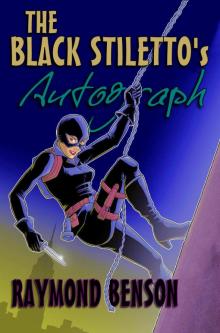 The Black Stiletto's Autograph
The Black Stiletto's Autograph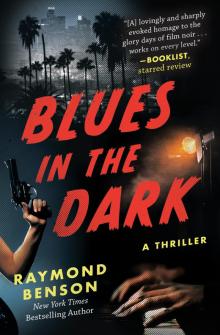 Blues in the Dark
Blues in the Dark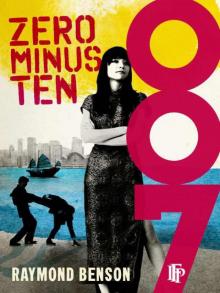 Zero Minus Ten
Zero Minus Ten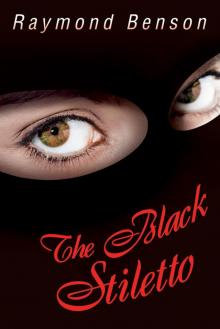 The Black Stiletto
The Black Stiletto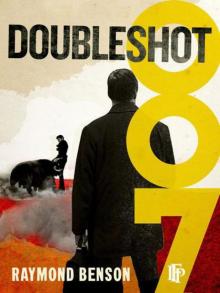 Doubleshot
Doubleshot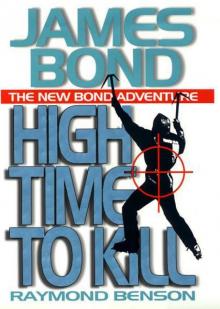 High Time To Kill rbb-3
High Time To Kill rbb-3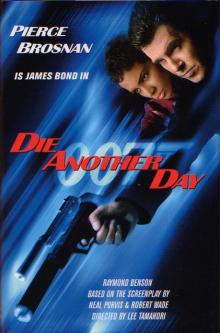 Bond Movies 07 - Die Another Day
Bond Movies 07 - Die Another Day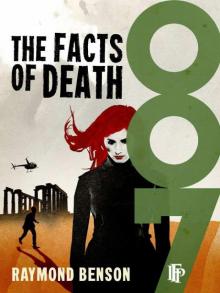 The Facts Of Death
The Facts Of Death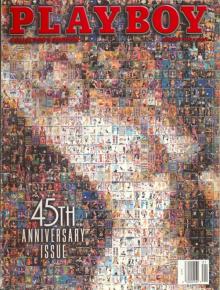 Midsummer Night's Doom
Midsummer Night's Doom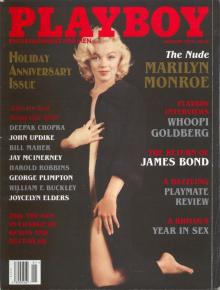 Blast from the Past
Blast from the Past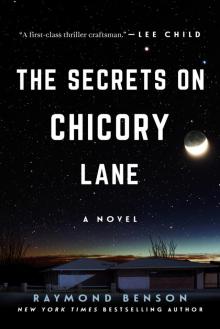 The Secrets on Chicory Lane
The Secrets on Chicory Lane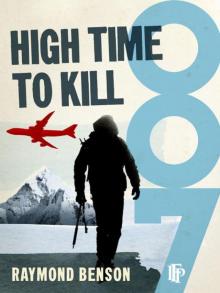 High Time To Kill
High Time To Kill The Black Stiletto: Black & White
The Black Stiletto: Black & White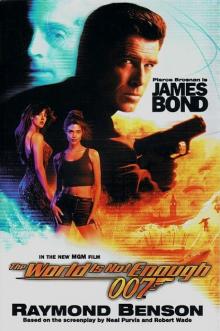 The World Is Not Enough jb-1
The World Is Not Enough jb-1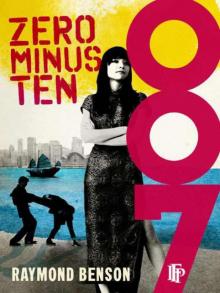 Zero Minus Ten rbb-1
Zero Minus Ten rbb-1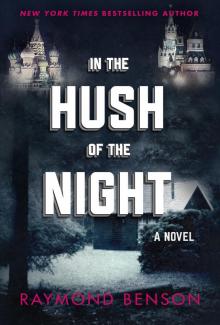 In the Hush of the Night
In the Hush of the Night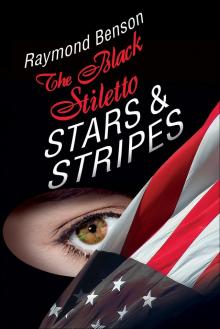 The Black Stiletto: Stars & Stripes
The Black Stiletto: Stars & Stripes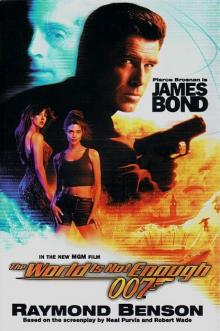 Bond Movies 06 - The World Is Not Enough
Bond Movies 06 - The World Is Not Enough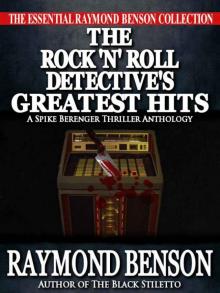 The Rock 'n Roll Detective's Greatest Hits - A Spike Berenger Anthology
The Rock 'n Roll Detective's Greatest Hits - A Spike Berenger Anthology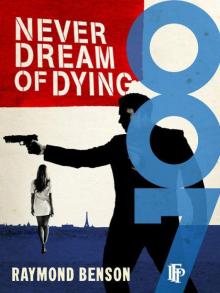 Never Dream Of Dying
Never Dream Of Dying